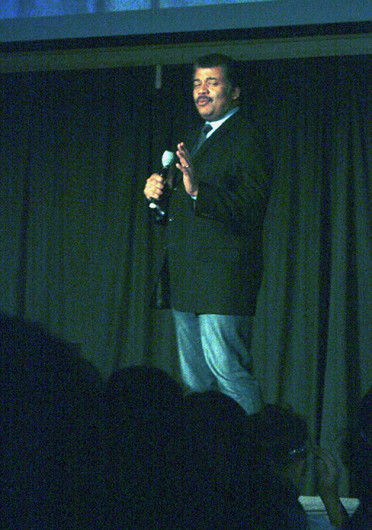
Astrophysicist Neil Degrasse Tyson begins his lecture, “Latest Discoveries in the Universe” in the Archie M. Griffin Ballroom in The Ohio Union Nov. 21. Credit: Matthew Homan / Lantern photographer
Astrophysicist Neil deGrasse Tyson was bombarded with questions about the sun, the stars and the chunks of rock that could one day catapult toward the Earth.
Tyson spoke candidly at the Ohio Union Thursday night for nearly two hours to a crowd of approximately 1,500 people about the intricacies of the universe and recently released findings in the astronomy field.
Since 1996, Tyson has been the director of the Hayden Planetarium at the American Museum of Natural History in New York City, where he helped others in his field demote Pluto from a planet to a dwarf planet in 2006, Tyson said.
“I was an accessory to the demotion of Pluto, I didn’t pull the trigger or anything, but I so drove the getaway car,” Tyson said to a chuckling crowd.
Tyson is passionate about preserving the group of study fields collectively known as STEM — science, technology, engineering and mathematics — that are often emphasized in education policy.
“As you innovate, those innovations make headlines, and those headlines stimulate our nation, stimulate America to become an innovation nation,” Tyson said. “When you’re an innovation nation, tomorrow is yours. You’ve guaranteed your economic security; you’re guaranteed your physical security. I see it as a fundamental force operating on the pipeline that will enable us to transform this country, to lead the world instead of following,”
The Thursday event was presented by the Ohio Union Activities Board.
“Neil deGrasse Tyson was chosen to speak because of his large appeal by college students, and his thought-provoking and entertaining lecture style. OUAB also knew we would reach a new demographic of students by bringing in a world-renown astrophysicist,” said Will Moore, a lecture chair of OUAB, in an email Friday.
In 1997, Tyson founded the department of astrophysics at the American Museum of Natural History, according to his website.
Tyson also talked about an asteroid named in his honor, something he initially approached with caution because of the potential consequences that came with it.
“I was very honored by that, but before I accepted the honor, I double-checked to make sure that asteroid wasn’t headed toward Earth,” Tyson said. “You don’t want to be that asteroid, asteroid Tyson bearing down on Earth.”
Tyson will soon be on TV — Carl Sagan’s “Cosmos: A Personal Voyage” TV series from the 1980s will be reborn and evolve in the spring of 2014 with “Cosmos: a Spacetime Odyssey” on Fox Network featuring Tyson as the host, he said.
“We want to expose it to everybody who doesn’t normally think about science,” Tyson said.
Tyson also said he’s looking forward to the future of space exploration, especially Dutch entrepreneur Bas Lansdorp’s plan to colonize Mars by 2023 called Mars One.
“He wants to create a permanent human colony, first with four people, but then will send more people. This is a colony like Mayflower style. You’re going with no plans of coming back, and he said, ‘Who’s with me,’ and the line was around the block,” Tyson said.
The NASA space program also came up in Tyson’s presentation when he talked about watching rockets launching into space in Cape Canaveral, Fla.
One of Tyson’s favorite parts of the rocket launches, he said, is watching the marshes trickling from the sound wave of the rockets’ launch from afar.
“You can actually watch the ripple of the sound wave, the leading edge of the sound wave, approach you as you’re watching it, it tickles the water on the way,” Tyson said.
OUAB could not disclose the cost of event to “ensure we remain competitive with talent agencies,” Moore said.


